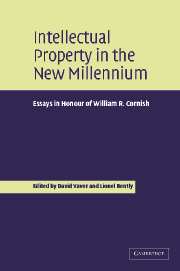Book contents
- Frontmatter
- Contents
- List of contributors
- Foreword
- Preface
- General intellectual property
- Patents and plant protection
- Trade marks and unfair competition
- Copyright, moral and neighbouring rights
- 15 The Berne Convention: the continued relevance of an ancient text
- 16 The (new?) right of making available to the public
- 17 Private copy licence and levy schemes: resolving the paradox of civilian and common law approaches
- 18 Paternalism and autonomy in copyright contracts
- 19 Criminality and copyright
- 20 Towards new forms of neighbouring rights within the European Union?
- William R. Cornish – curriculum vitae
- Index
18 - Paternalism and autonomy in copyright contracts
Published online by Cambridge University Press: 25 May 2010
- Frontmatter
- Contents
- List of contributors
- Foreword
- Preface
- General intellectual property
- Patents and plant protection
- Trade marks and unfair competition
- Copyright, moral and neighbouring rights
- 15 The Berne Convention: the continued relevance of an ancient text
- 16 The (new?) right of making available to the public
- 17 Private copy licence and levy schemes: resolving the paradox of civilian and common law approaches
- 18 Paternalism and autonomy in copyright contracts
- 19 Criminality and copyright
- 20 Towards new forms of neighbouring rights within the European Union?
- William R. Cornish – curriculum vitae
- Index
Summary
Most, if not all, of the great controversies in Anglo-American copyright situate copyright owners against copyright users – what William Cornish in his 2002 Horace S. Manges Lecture at Columbia Law School called a ‘two-dimensional’ approach ‘with its concentration upon the exclusive right to prevent users from engaging in infringing activities’. It must have been a surprise for many in Cornish's American audience to discover that this Cambridge luminary had crossed the Atlantic not to opine on such current battles as those between copyright owners and Internet users, but rather to weigh in on the ‘tripartite linkages implanted in European laws on author's rights’, specifically, French and German measures to protect authors from unfair exploitation by the publishers and other intermediaries who bring their works to market.
In fact, Cornish could not have selected a more timely topic, nor a better venue in which to explore it. It is the creative author who stimulates copyright's moral pulse, and the economic relationship between authors and publishers promises to be a dominating issue for copyright in the present century – even more so in the common law world than in the civil law world where doctrine already closely regulates this fraught relationship.
The focus of Professor Cornish's Manges Lecture was the mandatory remuneration provisions of the 1957 French Authors Rights Law and the 2002 amendments to the German Copyright Act providing, respectively, for proportional and minimum remuneration to authors (and, in the case of the German legislation, performers).
- Type
- Chapter
- Information
- Intellectual Property in the New MillenniumEssays in Honour of William R. Cornish, pp. 259 - 265Publisher: Cambridge University PressPrint publication year: 2004



